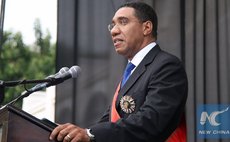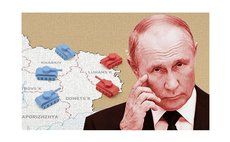Is the genie coming out of the bottle?
If the opinion polls are to be believed, the British electorate may vote by a small majority to leave the European Union (EU) in the country's June 23 referendum.
The latest UK polls suggest that 45 per cent of those voting will chose to go, while 42 per cent will say they want to remain. At present 13 per cent say they don't know. The concern is that if young people, who are predisposed to vote to remain, cannot be mobilised, and the leadership of the Labour Party do not do more to encourage its members to vote in the same way, the United Kingdom will be plunged into a period of economic and political turmoil with unpredictable consequences beyond it shores.
While the pollsters may be wrong, and there is still the possibility of change in voter sentiment, the markets believe that the vote may be to leave and have begun to price-in the cost of uncertainty and the possible instability that will follow.
Although logic and common sense is largely on the remain and economic side of the argument, the increasingly emotional case against staying appears to have gained traction in the last weeks. This seems to have occurred because the leave campaign has sought to appeal to the significant numbers in the UK who are deeply concerned about uncontrolled EU migration, and its impact on public services, education and housing.
With the support of the populist print media, and blind to the ways in which the world and Britain has changed since it became an EU member in 1973, many older and less educated voters outside London, have rejected the strong economic argument for remaining. Instead they intend using the referendum to express their concern about migration, ignoring the fact that any post-Brexit free trade relationship with the EU will require the continuing acceptance of the free movement of EU citizens.
To further confuse matters, an element of the leave campaign has morphed into an attempt to seize control the leadership of Britain's ruling Conservative Party by some who are seeking a rapid path to power; their reasoning being that the Prime Minister, David Cameron, could not continue for long in his post if the pro-EU campaign were to be defeated.
Earlier this year I wrote two columns about the implications for the region of a leave vote, and the need for the independent Caribbean and Britain's Overseas Territories to carefully think though how and in what way they should respond if the UK decides to withdraw from the EU.
At that time, I noted a number of potentially serious associated issues: the possible negative impact on Caribbean exports and the development flows it receives; a diminution in the region's ability to influence thinking on its policy concerns in Europe; a specific range of problems that will face the UK's overseas territories in the region; and a long period of uncertainty as Britain's foreign, trade and development policy is reoriented.
What has since become apparent, is that in addition to the issues mentioned, any vote to leave would have wider unpredictable consequences that may change the way we all come to see the world.
Firstly, it could result in the restructuring or the disintegration of the EU itself.
Within Europe there are already serious tensions as a result of the failure to agree how best to address the flood of refugees crossing the Mediterranean, the sluggish economic performance of the Eurozone, differences over the economic management of the nations of the south, and the issue of ever closer union.
In response a number of federalist European leaders have seen any UK vote to leave as the moment to strengthen the EU integration process.
However, speaking just days ago in Luxembourg, the European Council President, Donald Tusk, said that EU elites had provoked the revolt now erupting in many EU states. "We failed to notice that ordinary people, the citizens of Europe, do not share our Euro-enthusiasm. "The spectre of a break-up is haunting Europe."
He also bluntly warned European leaders that their "utopian" illusions were tearing Europe apart, and that any attempt to seize on Brexit to force through yet more integration would be a grave mistake.
The more probable focus, therefore, when all 28 EU leaders meet on June 28-29 will be on managing the expected financial and political turmoil if the UK votes to leave, and launching a formal process of reflection. Despite this, they are well aware that how they react to any decision by the British people to leave could exacerbate national concerns about the EU; for example, in France where, in an electoral year, the populist Fronte National sees an anti-EU stance and exit as vote winning.
Secondly, all of this is now causing alarm in Washington with statements coming from the White House, the military and the Federal Reserve stressing the importance of a strong and unified EU as a global partner in maintaining a stable economic, political and security environment.
Thirdly, in contrast, Russia would be delighted to see a weakening of EU unity. Over simplified, President Putin believes in competing spheres of influence, and is committed to restoring Russian power and greatness to the Russian people. He more than anyone would find helpful the exit of the UK and a less stable Europe, especially if it weakens the position of EU nations adjacent to his country's borders.
And finally, a no vote could trigger the ending of the UK as a unitary entity. Scotland, which is solidly for remaining in the EU, has made clear that if the country as a whole were to vote to leave, it would consider seeking another referendum on independence as it would wish to remain within the EU. The consequence being that that the global economic and power and influence of what then is left of the UK would be severely diminished.
All of which could coincide with Donald Trump becoming the US President. Even if you believe a fraction of what he says, it is clear that if he becomes President he would tear up the world order of the last seventy years in favour of a transactional, protectionist approach and would take steps that challenge almost every US relationship.
How the Caribbean might respond to letting all these genies out of the bottle at once is far from clear.
It is a subject I will return to.
David Jessop is a consultant to the Caribbean Council He can be contacted at david.jessop@caribbean-council.org
Previous columns can be found at www.caribbean-council.org June 3rd, 2016



